Choose Your Path to Success and Select Your Learning Community
What’s a Learning Community?
Learning communities are small groups of students who take two classes together during
their first semester at South. These classes are based on your major or interests,
so you'll be with people who share similar goals. It's a great way to make friends,
build a support system, and feel more connected to campus right away. Plus, students
in learning communities are more likely to stay on track and graduate on time!
Student Testimonials:
"Being in a learning community helps in the classroom and out. This community is filled
with people that have the same major as you so multiple classes are the same. In the
classroom, it makes students more comfortable to participate and share ideas because
they are looking at the same faces and have grown close to the people in the community."
"The value of being part of a learning community has been more beneficial than I thought it would be. At the beginning of the year, I wasn't even aware that I had a learning community. It wasn't until the second or third week of school that I realized I had people to study with or do assignments. As I got to know my classmates I learned about them more as a person, not just someone I sat next to in class."
"Being a part of a learning community has helped me in so many ways! It connected me with students with similar academic interests. It has provided me with familiar faces that I eventually made connections with. I have multiple classes with the same people which helps a lot because I can lean on them to help me study and learn more about the subject. We help each other out and motivate each other to do well. If I wasn't in a learning community, I would probably be more anxious about doing well in my courses."
When choosing your Learning Community course, consider your interests and anticipated major. Click here to explore your options with Meta Majors.
Incoming Credits: Do not select a course that you may receive credit for such as Dual Enrollment, AP, or IB.
English and Math: These courses are great options for first year students, and are required of every major. English and Math have prerequisite requirements. Your advisor will place you in the appropriate course if you choose one of these options.
If you would like the opportunity to take the Math Placement test, click here.
Each course below is connected to a First Year Experience Course which creates a learning community.
Your First Year Experience course will help you maximize your potential to achieve academic success and to adjust responsibly to the individual and interpersonal challenges presented by college life. Taught in small groups, the course provides an introduction to the nature of higher education and a general orientation to the functions and resources of the University.
You and your advisor will choose your Learning Community during your advising appointment.
Below are Learning Community options and the colleges they are connected to. Find the college you belong to and click on each course to read a brief description. The Learning Community course you choose will be connected to a first year experience course.
Covey College of Allied Health Professions
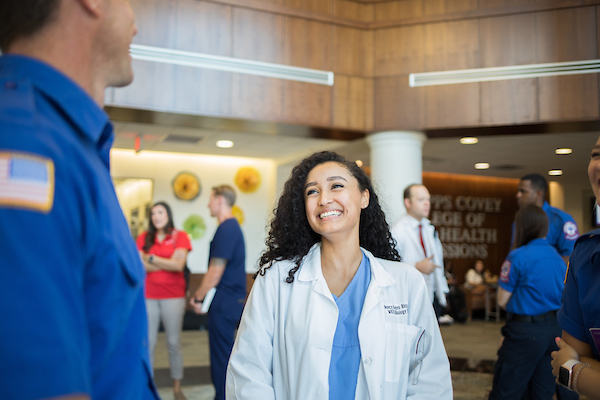
The departments of instruction in the Covey College of Allied Health Professions include Biomedical Sciences, Emergency Medical Services, Occupational Therapy, Physician Assistant Studies, Physical Therapy, Radiologic Sciences, and Speech Pathology and Audiology. The college offers certificate programs, undergraduate programs, and graduate programs. Covey College of Allied Health Professions is dedicated to the provision of the highest quality in basic medical sciences and health professional education to meet healthcare needs and to contribute to new knowledge through research. The allied health programs vary in specialization and are either clinical or non-clinical in nature.
Starting college is a big deal—this course helps you figure it all out. You’ll get
support adjusting to college life, learn what it really means to be a student in a
health-related major, and connect with classmates in a small-group setting. Think
of it as your guide to thriving, not just surviving, in college.
Ever wondered how life works on a microscopic level? This course is your deep dive into the basics of biology—cells, genetics, evolution, and even the weird world of bacteria and fungi. Perfect if you’re headed for anything in health or science.
Peek behind the curtain of the biomedical world. This class introduces you to cutting-edge research, careers in biomed, and how to use research tools like a pro. You’ll explore what’s possible in the field—and maybe discover your future path.
This course focuses on the biological basics that make human life possible. You'll
study cells, energy use, and organ systems—foundational knowledge for anyone entering
nursing, allied health, or other health-related fields.
Explore how people think, feel, and behave through the lens of psychological science.
You’ll gain insight into human behavior that’s especially relevant for those entering
health care and support professions.
College of Arts and Sciences
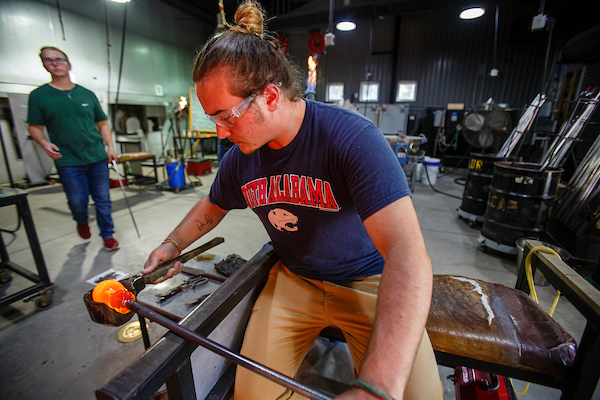
This Meta Major focuses on a broad understanding of your world and enhances your ability to think critically and communicate effectively. It combines disciplinary knowledge with invention, teamwork, and creativity, a major in this area will provide you with the skills and flexibility to pursue a variety of career paths or graduate study. Click on Language, Arts, and Design above to discover majors that fall into this category.
Begin your college journey with a course designed to help you transition smoothly into university life. You'll explore the nature of higher education, familiarize yourself with campus resources, and develop strategies for academic success.
Explore the origins and development of human cultures through archaeological evidence
and biological anthropology. This course introduces you to human evolution, genetics,
and the study of primates, providing a comprehensive understanding of our species'
past.
Develop foundational skills in music theory, including part writing, analysis, counterpoint, sight singing, dictation, and keyboard harmony. This course is essential for music majors seeking to enhance their theoretical and practical understanding of music.
Gain a broad overview of theatre practices, including performance, production, and the historical context of theatrical works. This course offers insights into the collaborative nature of theatre and its role in society.
Examine the scientific study of social behavior and phenomena. This course covers
major concepts, theories, and methods in sociology, exploring topics such as social
structures, inequalities, culture, and globalization.
Survey the history of Western art from prehistoric times through the Middle Ages.
You'll study significant artworks and architectural developments, understanding their
cultural, economic, religious, and historical contexts.
Explore the formative periods of American history, including Native American societies,
colonial development, the American Revolution, slavery, the Civil War, and Reconstruction.
This course provides a comprehensive understanding of the nation's early history.
Delve into philosophical discussions about morality, examining ideas of good and bad, right and wrong, and moral obligations. This course surveys major ethical systems and applies them to contemporary moral issues.
Explore how people think, feel, and behave through the lens of psychological science.
From memory and emotion to personality and mental health, you’ll get a broad introduction
to what makes us tick.
Investigate the physical, chemical, geological, and biological aspects of oceanography. This course provides a comprehensive understanding of ocean systems and their significance to Earth's environment.
Examine the principles of the U.S. Constitution and the roles of Congress, the President, and the courts. This course also explores the influence of mass media, interest groups, and other factors in the American political system.
Trace the development of Western civilization up to 1600 C.E., covering topics such as Mesopotamia, Ancient Egypt, Greece, Rome, the origins of monotheistic religions, and medieval Europe. This course offers insights into the foundations of Western society.
Understand the structural components of the global system, including nation-states and the world economy. This course explores major schools of thought in areas like security, economic development, international law, gender, and environmental studies, placing the U.S. within a broader global context.
Study general biological principles, including the chemical basis of life, cellular biology, genetics, microevolution, and a survey of simple organisms like bacteria, protists, and fungi. This course lays the groundwork for advanced biological studies.
Explore culture as a set of integrated behaviors and meanings learned in social environments. This course examines the diversity of human cultural practices, focusing on kinship, gender, religion, subsistence, and politics, with an emphasis on language as a means of cultural transmission.
MA 112 – Precalculus Algebra
Build your skills with polynomial, exponential, rational, and logarithmic functions.
This course helps you connect algebra with real-world applications, preparing you
for the leap into calculus and beyond.
MTH 101 – Essentials for Precalculus
Need a solid math foundation before tackling college-level precalc? This course helps
you sharpen your algebra skills, master graphing, and feel confident solving equations—no
shortcuts, just smart prep.
Survey major world regions, excluding North America, focusing on the interplay of environmental, cultural, economic, and political factors that define each region. This course enhances your global awareness and geographical understanding.
Gain an overview of crime in the U.S. and the three major criminal justice agencies: law enforcement, courts, and corrections. This course provides foundational knowledge for those interested in the criminal justice system.
Achieve basic proficiency in Spanish communication by developing listening, speaking, reading, and writing skills. This course is ideal for beginners aiming to build a strong foundation in the Spanish language.
Explore fundamental chemistry topics, including the nuclear model, stoichiometry, chemical reactions, gas laws, thermochemistry, atomic structure, and molecular bonding. This course is essential for students pursuing science-related fields.
Develop mathematical concepts and interpret data used in societal contexts. Topics include percentages, graph analysis, estimation, apportionment, growth models, interest calculations, and descriptive statistics, with an emphasis on technology applications like Excel.
Mitchell College of Business
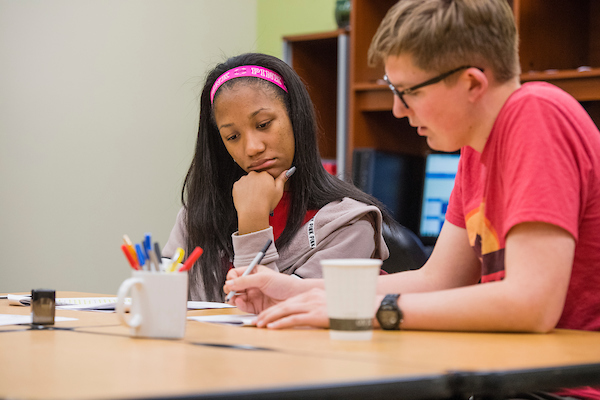
The Mitchell College of Business offers undergraduate majors in Accounting, Economics, Finance and Real Estate, International Business, Management, Marketing, and Supply Chain and Logistics Management. Holding both the AACSB business and separate accounting accreditations, the College also offers a Master of Business Administration, Master of Accounting, and Ph.D. in Business Administration. We emphasize experiential learning opportunities throughout the curriculum including a required internship, course assignments, and center-driven projects. The Mitchell College prides itself in ensuring that its students are more than just a number.
Curious about how businesses actually work? This course gives you a big-picture view of everything from startups and non-profits to global corporations. You’ll learn the basics of management, marketing, ethics, and entrepreneurship—plus how businesses impact the world around us.
BUS 101 – Professional Experience I
Think of this as your starter kit for career success. You’ll explore your strengths
and interests, build a résumé, learn how to stand out professionally, and get involved
on campus. It's all about helping you connect what you’re learning to the career you
want.
College of Education and Professional Studies

Whether it's becoming a teacher, librarian, counselor, health or fitness professional, corporate trainer or leader in industries like tourism or sports, or customizing your degree in interdisciplinary studies - we have a path for you. The College of Education and Professional Studies provides a variety of undergraduate and graduate degrees and certificates hosted in the Departments of Counseling and Instructional Sciences; Health Kinesiology and Sport; Hospitality and Tourism Management; Integrative Studies; and Leadership and Teacher Education.
College of Engineering
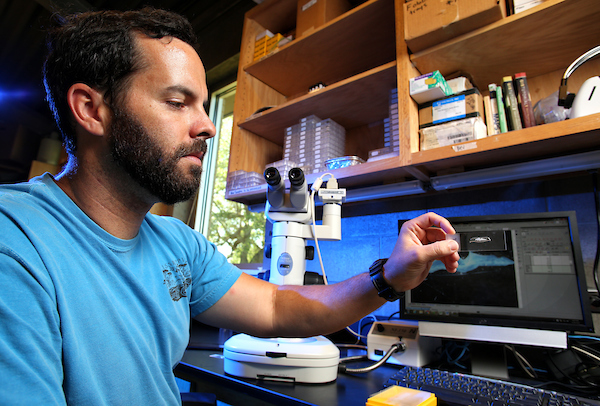
At the University of South Alabama, the College of Engineering is ready to help you prepare for a successful career. Our city and surrounding region are home to many engineering and technology companies that encourage and support our students with internships, co-ops, and excellent career opportunities.
Build your skills with polynomial, exponential, rational, and logarithmic functions. This course helps you connect algebra with real-world applications, preparing you for the leap into calculus and beyond.
MTH 101 – Essentials for Precalculus
Need a solid math foundation before tackling college-level precalc? This course helps you sharpen your algebra skills, master graphing, and feel confident solving equations—no shortcuts, just smart prep.
College of Nursing
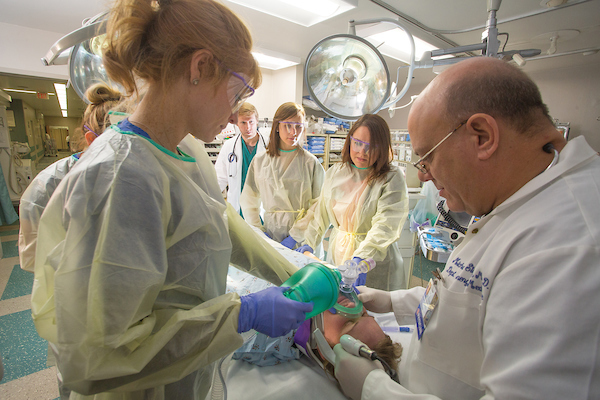
The Bachelor of Science in Nursing program maximizes the value of each student’s educational background. Traditionally, the first two years are spent in meeting general university requirements with courses in science, math, arts and humanities, while the last two years are focused on the professional preparation in nursing. The CON offers an accelerated program for students who have earned a bachelor’s degree in another field. In addition, an RN-BSN pathway is available to RNs who have completed an Associate Degree in Nursing or a diploma.
You’ll examine topics like stress, cognition, and behavior—key to understanding patients, health outcomes, and care environments.
School of Computing

The School of Computing at USA prepares students for jobs in a career field that is rich with a variety of opportunities. When students graduate, they are equipped for today's ever-changing, technology-driven job market. Our undergraduate majors are Computer Science, Information Systems, Information Technology, and Health Informatics. Additionally, we have three graduate programs: Computer Science, Cybersecurity, and Information Systems, and a Ph.D. in Computing. Our state-of-the-art facilities, opportunities for internships, and cutting-edge research provide our students with an exceptional learning experience.
If you have questions or would like to speak with an Academic Advisor, contact Academic Advising & Transfer Services at 251-341-4017 or aats@southalabama.edu.



